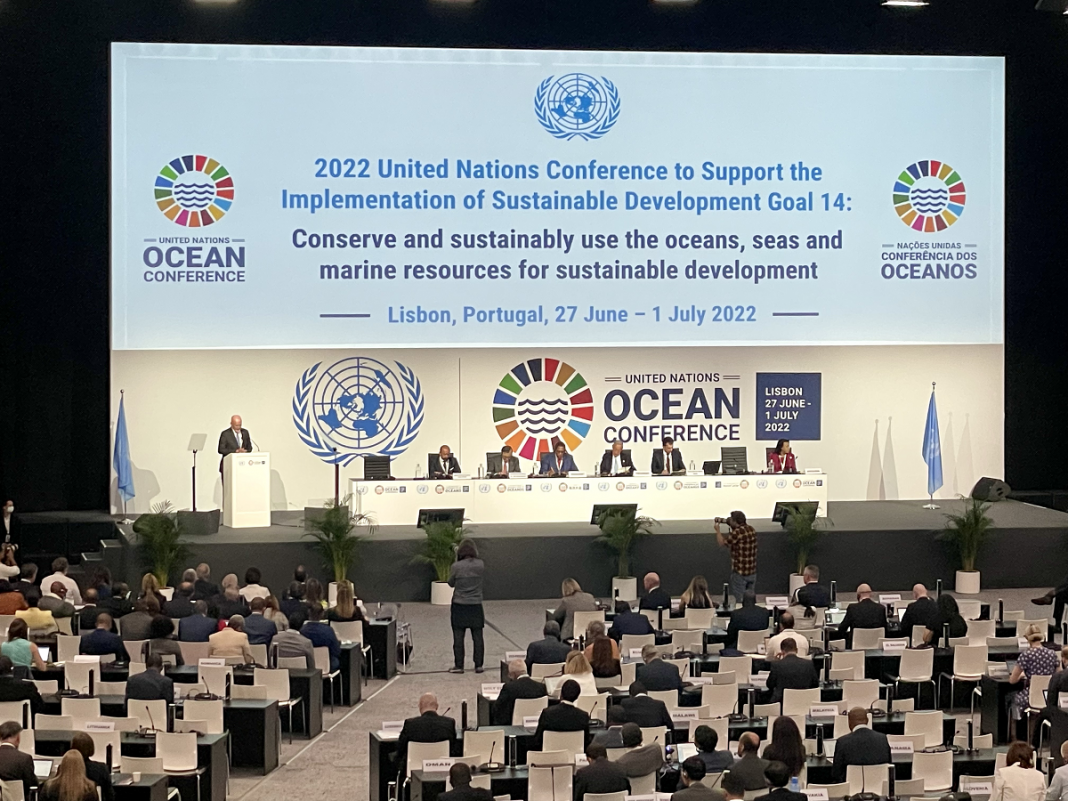The United Nations Sustainable Development Goals (SDG’s) were adopted in 2015 as a core part of the 2030 Agenda for Sustainable Development. 17 SDG’s were implemented with 169 targets and 231 unique indicators. One of the SDG’s received exceptional attention over the past week, SDG 14: Life Below Water. From June 27 through July 1, the city of Lisbon, Portugal was bustling with the excitement of the second UN Ocean Conference. The theme for this year’s Conference was “Scaling up ocean action based on science and innovation for the implementation of Goal 14: stocktaking, partnerships and solutions.” From the plenary speeches in the Altice Arena to the many side events all along the coastline and into downtown Lisbon and beyond, the ocean took center stage.
SDG 14 is the least funded of all the SDG’s but may have the potential for the most solutions. Our blue planet is covered by 71% water and the majority of life on Earth is in the oceans. The first UN Ocean Conference was held in 2017 in New York. This year’s conference was originally planned to be held in 2020 but was postponed due to the covid-19 pandemic. The five-day conference in Lisbon was cohosted by the governments of Portugal and Kenya. There were over 6,000 participants in attendance, including 24 Heads of State and Government alongside nonprofits, private entities, and other stakeholders, including our own Founder and CEO of NSE Global, Sergio Lang.
UN Secretary General Antonio Guterres delivered an empowering and striking speech at the opening ceremony on June 27, partially in Portuguese as Lisbon is his home town. He stated “we live on a blue planet, the ocean connects us all. Sadly, we have taken the ocean for granted, and today we face what I would call an ocean emergency. We must turn the tides.”
The global average sea level has risen about 101 mm (approx. 4 in) since 1993. Global ocean temperatures are at all-time highs. Experts say that about 8 million metric tons of plastic pollution end up in the oceans every year. Overfishing is decimating marine species populations. It is estimated that if greenhouse gas emissions remain status quo, by the end of the century ocean acidification could drop to a pH level of 7.8. The last time ocean pH was that low was between 14 and 17 million years ago during another mass extinction.
With all of this happening, it is crucial now more than ever that global solutions be implemented and action be taken immediately to protect ocean health. Many announcements and voluntary commitments were shared during the week. Notable actions include;
– The Protecting Our Planet Challenge committed to invest at least $1 billion by 2030 to protect 30% of the oceans by 2030. This includes expansion and management of marine protected areas.
– John Kerry, the US Special Presidential Envoy for Climate, announced a memorandum to combat IUU (Illegal, Unreported, and Unregulated) fishing.
– The European Investment Bank will give 150 million Euros in the Caribbean Region as part of the Clean Oceans Initiative.
– Global Environment Facility approved a $25 million grant towards Colombia’s Marine Protected Areas (MPA’s).
– The Development Bank of Latin America committed $1.2 billion to support ocean projects in the region.
– India committed to a Coastal Clean Seas Campaign to ban single-use plastics.
– Kenya committed to developing a national action plan on sea-based marine plastic litter.
– An alliance was launched for a deep-sea mining moratorium.
This global effort to protect our oceans from the damage and current unsustainable practices is a promising sign for the future. The UN Under Secretary General for Legal Affairs, Miguel de Serpa Soares, stated at the closing press conference “there is incredible momentum around oceans in the international agenda.” This hopefully will not only continue but strengthen in the coming months and years to come.
The conference concluded with the unanimous adoption of the Lisbon Declaration. The declaration is a seventeen paragraph document addressing issues such as restoring fish stocks, combating IUU, mobilizing actions for sustainable fisheries, controlling marine pollution of all kinds, implementing MPA’s, and much more.
At the closing plenary Peter Thomson, the UN Special Envoy for the Ocean, reiterated a critical remark from Antonio Guterres stating “a deep, deep apology on behalf of our generation to the youth of the world, and a commitment that we will spend our remaining years helping them identify and implement the solutions to get out of the terrible problems that we have created for them.”
As the 2022 UN Ocean Conference came to a close we hope all its participants left with a sense of hope and urgency. It was undoubtedly an informative week filled with comradery towards our unifying ocean. The next UN Ocean Conference will be cohosted by France and Costa Rica in 2025. Until then. #saveourocean

